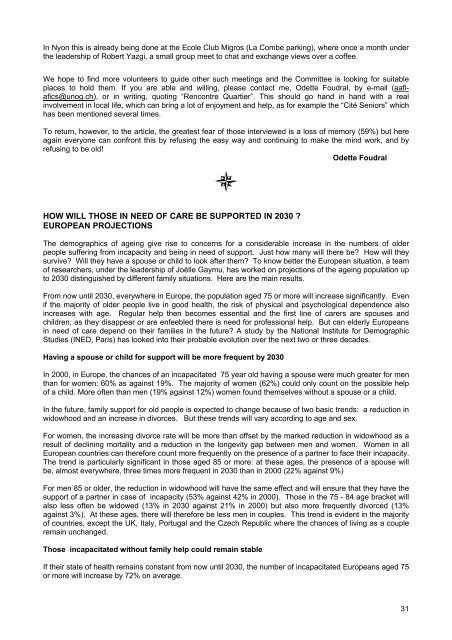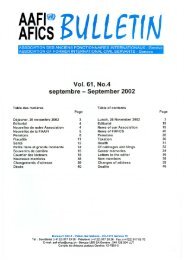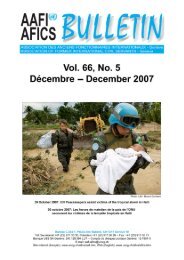VOL. 68, NO. 2 - AAFI-AFICS, Geneva - UNOG
VOL. 68, NO. 2 - AAFI-AFICS, Geneva - UNOG
VOL. 68, NO. 2 - AAFI-AFICS, Geneva - UNOG
You also want an ePaper? Increase the reach of your titles
YUMPU automatically turns print PDFs into web optimized ePapers that Google loves.
In Nyon this is already being done at the Ecole Club Migros (La Combe parking), where once a month under<br />
the leadership of Robert Yazgi, a small group meet to chat and exchange views over a coffee.<br />
We hope to find more volunteers to guide other such meetings and the Committee is looking for suitable<br />
places to hold them. If you are able and willing, please contact me, Odette Foudral, by e-mail (aafiafics@unog.ch),<br />
or in writing, quoting “Rencontre Quartier”. This should go hand in hand with a real<br />
involvement in local life, which can bring a lot of enjoyment and help, as for example the “Cité Seniors” which<br />
has been mentioned several times.<br />
To return, however, to the article, the greatest fear of those interviewed is a loss of memory (59%) but here<br />
again everyone can confront this by refusing the easy way and continuing to make the mind work, and by<br />
refusing to be old!<br />
Odette Foudral<br />
HOW WILL THOSE IN NEED OF CARE BE SUPPORTED IN 2030 ?<br />
EUROPEAN PROJECTIONS<br />
The demographics of ageing give rise to concerns for a considerable increase in the numbers of older<br />
people suffering from incapacity and being in need of support. Just how many will there be? How will they<br />
survive? Will they have a spouse or child to look after them? To know better the European situation, a team<br />
of researchers, under the leadership of Joëlle Gaymu, has worked on projections of the ageing population up<br />
to 2030 distinguished by different family situations. Here are the main results.<br />
From now until 2030, everywhere in Europe, the population aged 75 or more will increase significantly. Even<br />
if the majority of older people live in good health, the risk of physical and psychological dependence also<br />
increases with age. Regular help then becomes essential and the first line of carers are spouses and<br />
children; as they disappear or are enfeebled there is need for professional help. But can elderly Europeans<br />
in need of care depend on their families in the future? A study by the National Institute for Demographic<br />
Studies (INED, Paris) has looked into their probable evolution over the next two or three decades.<br />
Having a spouse or child for support will be more frequent by 2030<br />
In 2000, in Europe, the chances of an incapacitated 75 year old having a spouse were much greater for men<br />
than for women: 60% as against 19%. The majority of women (62%) could only count on the possible help<br />
of a child. More often than men (19% against 12%) women found themselves without a spouse or a child.<br />
In the future, family support for old people is expected to change because of two basic trends: a reduction in<br />
widowhood and an increase in divorces. But these trends will vary according to age and sex.<br />
For women, the increasing divorce rate will be more than offset by the marked reduction in widowhood as a<br />
result of declining mortality and a reduction in the longevity gap between men and women. Women in all<br />
European countries can therefore count more frequently on the presence of a partner to face their incapacity.<br />
The trend is particularly significant in those aged 85 or more: at these ages, the presence of a spouse will<br />
be, almost everywhere, three times more frequent in 2030 than in 2000 (22% against 9%)<br />
For men 85 or older, the reduction in widowhood will have the same effect and will ensure that they have the<br />
support of a partner in case of incapacity (53% against 42% in 2000). Those in the 75 - 84 age bracket will<br />
also less often be widowed (13% in 2030 against 21% in 2000) but also more frequently divorced (13%<br />
against 3%). At these ages, there will therefore be less men in couples. This trend is evident in the majority<br />
of countries, except the UK, Italy, Portugal and the Czech Republic where the chances of living as a couple<br />
remain unchanged.<br />
Those incapacitated without family help could remain stable<br />
If their state of health remains constant from now until 2030, the number of incapacitated Europeans aged 75<br />
or more will increase by 72% on average.<br />
31
















